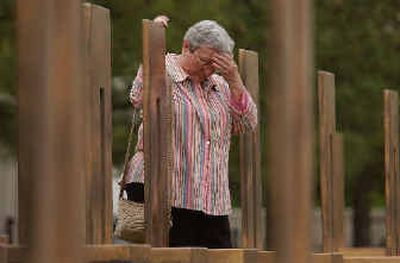”Lone wolf” domestic terrorists still a big threat

WASHINGTON – As the nation marks the 10th anniversary of the Oklahoma City bombing today, the threat of domestic terrorism is being overshadowed by foreign terrorism even though domestic terrorists have greater access than ever to knowledge they could use to kill large numbers of people.
“It’s much easier now to get the know-how and material for bombs and other devices, and it’s almost an insurmountable task to track these unrestrained independent operators,” said Brian Levin, director of the Center for the Study of Hate and Extremism at California State University.
The cases of Oklahoma City bomber Timothy McVeigh and Eric Rudolph, the anti-abortion terrorist who pleaded guilty last week to four bombings, demonstrated that “lone wolves,” with little help and loose ties to organized groups, can wreak havoc and even inspire copycats.
“Paradoxically, as some extremist groups lose steam, individuals become more desperate to take action on their own,” said Bruce Hoffmann, a terrorism expert with the RAND Corp., a think tank that offers strategy advice to the government.
“An individual or small cell is capable of enormous damage.”
Larger hate groups that advocate violence often are foiled by internal rivalries, incompetent planning and informants or the fear of them, Levin said. But individuals and small groups can be harder to uncover and stop.
Some experts worry, for example, that an 11-page manifesto Rudolph wrote, describing his personal war against abortion, may encourage others to resort to violence.
Ed Cogswell, an FBI spokesman, said Monday that in tracking domestic terrorism, “the lone wolf has always been our primary concern.”
Before Sept. 11, 2001, the most lethal attack on U.S. soil was McVeigh’s crude 4,800-pound fertilizer truck bomb, which killed 168 people in Oklahoma City. But the World Trade Center attacks made foreign terrorists the priority for the FBI and other federal agencies, and some experts on extremism believe attention to domestic threats lost ground.
“The threat from al Qaeda is very real, but I think there has been a definite tendency for the pendulum to swing too much to the external threat,” said Mark Potok, who monitors extremist groups for the Southern Poverty Law Center in Atlanta.
The militia movement has dwindled since the 1990s, Potok said, and the center has successfully sued white supremacist groups, such as the Aryan Nations, which went bankrupt.
But he said extremists hatched 40 to 50 plots involving violence in the last five years. Most were foiled by informants, incompetence or a participant getting cold feet.
One plan by Ku Klux Klansmen to blow up a propane tank farm in Texas could have killed thousands, authorities said.
Last year, white supremacist William Krar was sentenced in Texas to 11 years in prison for stockpiling enough sodium cyanide to kill everyone inside a large building.
“It’s virtually inevitable that we’ll see another attack like Oklahoma City carried out by domestic terrorists,” Potok said.
In his annual threat assessment in February, FBI Director Robert Mueller cited the “ongoing threat” of violence from anti-abortion extremists, eco-terrorists and other groups.
But the Department of Homeland Security, which also assesses threats, has disregarded the danger posed by right-wing extremist groups, said a group of Democrats on the House Homeland Security Committee.
They pointed to a draft report by the department, disclosed last month by Congressional Quarterly, which listed the Animal Liberation Front and Earth Liberation Front as threats but not white supremacist or radical anti-abortion groups.
Rep. Bennie Thompson, D-Miss., the ranking Democrat on the committee, and other Democrats plan to ask the department today to focus more on radical right-wing groups.
“That was an outrageous omission by Homeland Security,” Potok said. “Eco-terrorism is serious, but it’s directed at property. To put that on a par with 168 killed is a mistake.”